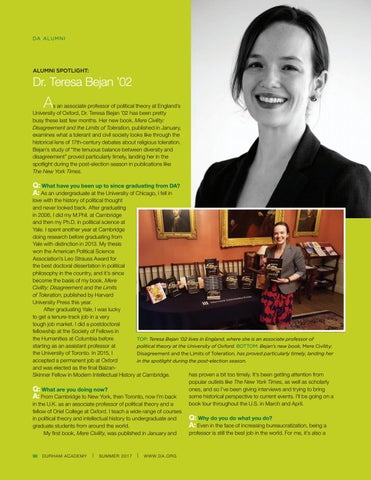DA ALUMNI
ALUMNI SPOTLIGHT:
Dr. Teresa Bejan ’02
A
s an associate professor of political theory at England’s University of Oxford, Dr. Teresa Bejan ’02 has been pretty busy these last few months. Her new book, Mere Civility: Disagreement and the Limits of Toleration, published in January, examines what a tolerant and civil society looks like through the historical lens of 17th-century debates about religious toleration. Bejan’s study of “the tenuous balance between diversity and disagreement” proved particularly timely, landing her in the spotlight during the post-election season in publications like The New York Times.
Q: What have you been up to since graduating from DA? A: As an undergraduate at the University of Chicago, I fell in love with the history of political thought and never looked back. After graduating in 2006, I did my M.Phil. at Cambridge and then my Ph.D. in political science at Yale. I spent another year at Cambridge doing research before graduating from Yale with distinction in 2013. My thesis won the American Political Science Association’s Leo Strauss Award for the best doctoral dissertation in political philosophy in the country, and it’s since become the basis of my book, Mere Civility: Disagreement and the Limits of Toleration, published by Harvard University Press this year. After graduating Yale, I was lucky to get a tenure-track job in a very tough job market. I did a postdoctoral fellowship at the Society of Fellows in the Humanities at Columbia before TOP: Teresa Bejan ’02 lives in England, where she is an associate professor of starting as an assistant professor at political theory at the University of Oxford. BOTTOM: Bejan’s new book, Mere Civility: the University of Toronto. In 2015, I Disagreement and the Limits of Toleration, has proved particularly timely, landing her accepted a permanent job at Oxford in the spotlight during the post-election season. and was elected as the final Balzanhas proven a bit too timely. It’s been getting attention from Skinner Fellow in Modern Intellectual History at Cambridge. popular outlets like The New York Times, as well as scholarly ones, and so I’ve been giving interviews and trying to bring Q: What are you doing now? some historical perspective to current events. I’ll be going on a A: From Cambridge to New York, then Toronto, now I’m back book tour throughout the U.S. in March and April. in the U.K. as an associate professor of political theory and a fellow of Oriel College at Oxford. I teach a wide range of courses Q: Why do you do what you do? in political theory and intellectual history to undergraduate and A: Even in the face of increasing bureaucratization, being a graduate students from around the world. professor is still the best job in the world. For me, it’s also a My first book, Mere Civility, was published in January and
90
DURHAM ACADEMY
|
S U M M ER 2 0 1 7
|
W W W.DA.ORG
